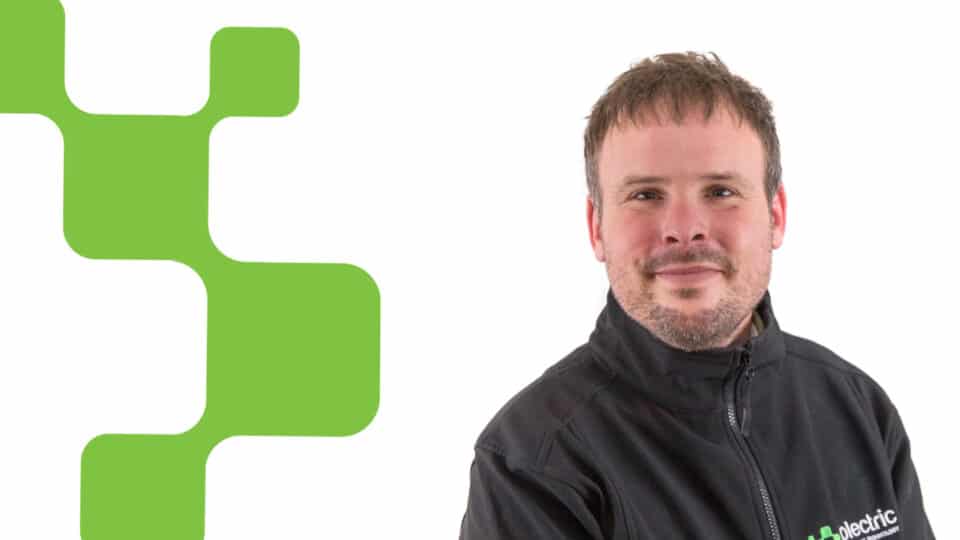
What is your current role, and what are your main responsibilities?
As the Product Development Manager at Prolectric I manage a team consisting of mechanical, electrical and CAD engineers who are responsible for bringing products through their initial concept and prototyping phase to full scale production and post-launch customer support. I work closely with Owen Pearson, Innovation Lead, to develop Prolectric’s five-year product development and innovation strategy, which enables the business to remain ahead of the market and lead the way with our new product offerings. The products we develop cover our three pillars of innovation REDUCE (wasted power by lowering energy use and turning things, not in use, off), GENERATE (as much renewable power as possible on site) and FUEL (bringing renewable energy to site in the form of fuel).
What inspired you to pursue this field, and how did you get started?
I have been working in the off-grid renewable sector since 2007 when I joined a burgeoning solar generator manufacturer as an intern. I quickly realized that this was the perfect place for me and I progressed with them from Account Manager to Operations Director over the course of 7 years as the business grew from 4 to 50 employees. At university, I touched upon the possibilities of renewable energy with my course and I seized the opportunity to be involved in the growth and development of off-grid solar hybrid power from what was a nascent niche industry then, to where we are today, seeing all of the major generator manufacturers, plant hirers, Tier 1 and Tier 2 contractors adopting the technology.
What do you consider to be the biggest challenge facing our industry today?
I’d say the biggest challenge we face is finding the way to finally ditch the diesel. All of the innovative battery and solar technology products we are seeing come to market are making huge savings on diesel consumption and C02 emissions but unless you have successfully paired your load with your solar generation capability (like our solar tower lights enable) the systems still need charging from a source which is more often than not a diesel generator. HVO seemed like a miracle cure being proclaimed as carbon neutral but there are issues over the supply chain and how the fuel is produced which has left many people questioning its true sustainability. Hydrogen may be the answer, but we currently don’t have a plentiful supply of green hydrogen in the UK (hydrogen produced from renewable sources rather than from fossil fuel-based processes) to be able to service the off-grid power requirements we have. I’m sure we will get there but the path is still uncertain at present.
How do you see the industry evolving in the next 5-10 years, and what trends do you think will drive this evolution?
I think we will continue to see a rise in the uptake of off-grid solar and battery systems with an increase in output, capacity and complexity – the buoyancy of the market will see innovation increase at a pace we’ve not seen before. I expect that hydrogen will become a part of the energy mix and that the use of telematics and control systems will help to utilize these renewable solutions at their maximum efficiency. The way end users consume energy may well change with different business models explored, such as £/kWh pricing that will help to make solar more appealing due to the low cost of onsite production.
How do you think technology is impacting the industry, and what opportunities and challenges does this present?
There is currently a massive shift change within the industry with the movement towards renewables and this is all being driven by the improvements in technology. The opportunities are huge for a variety of businesses to find their niche and disrupt the traditional way of delivering power. In terms of challenges, it will be important to back the right technology and ensure that we can keep up with the pace and remain meaningful. We will also need to ensure that we have skilled employees available to conceive, build, sell and support the range of technologies that will be adopted.
How do you balance competing priorities and demands within the industry, such as innovation versus risk management?
We regularly keep in touch with our customers with innovation sessions to gauge where they are with their journeys and check in with what they might want to see over the next 5 years. Our development process is structured so all projects are validated from a technology and market perspective before we get to the point of capitalized development, so we are confident that what we are bringing to market is the right product at the right time and fits with the business model for Prolectric. In this sector, you need to be prepared to take risks and not rest on your laurels but this risk can be mitigated by having the correct controls in place, so we ensure that compliance is firmly at the heart of what we do in the department.
What are some common misconceptions about our industry you can dispel?
Amazingly there are still people who think that solar doesn’t work in the UK and that it can’t be a meaningful part of a renewable energy system. Prolectric has gone a long way to dispelling this myth with our solar lighting products and the impact of the solar on the efficiency of our power product portfolio is substantial. As we expand our product envelope, we need to endeavor to maintain the solar-first approach with has served us so well to date.














![The Ultimate Guide to Choosing Tower Lights 2025 Prolectric ProRXM Solar Tower Light Highways [Day]](https://prolectric.co.uk/wp-content/uploads/2024/04/Pro-RXM-Highways-Day-scaled.jpg)
